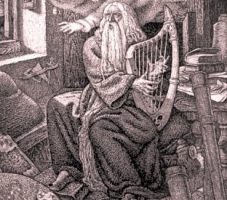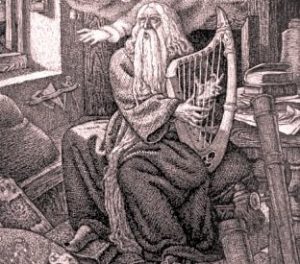This literary essay is written by one of my grade 12 students. She has stated a very clear thesis about the power of art and imagination in shaping the world we live in. She has included very clear quotes from the novel and provided accurate explanations and conclusions. Her analysis clearly shows The Shaper is able to unite the Danes by creating a sense of pride and propagating love and peace among the Danes. She makes a connection to the real world when she states the reason why art and imagination are not tolerated in certain places.
Reshaping the World
Art and language are powerful tools; they are means of communication and expression as well as sources of motivation and inspiration. They are lenses through which people can view the world. Not only can art and language bring people satisfaction and enjoyment, but they can also reshape and change people’s perception of their lives. And this transformative nature of art and language is embodied in the character of the Shaper, a harpist and a storyteller in the novel Grendel. Through using the power of art, poetry, and imagination, the Shaper is able to glorify the Danish history and revive hope and vision among the Danes, ultimately converting the kingdom into a more united and meaningful place. The artistic forte in the Shaper helps him instill in the Danes a sense of pride, foster the idea of heroism, propagate the seed of love and peace, and provide a vision for the Danes to pursue a more daring and meaningful future.
Through his influential art, the Shaper glorifies Hrothgar and the Danish kingdom, bringing the Danes a sense of pride that binds them together. The Shaper sings about the heroic Danish history, telling them “how Scyld by the cunning of arms had rebuilt the old Danish kingdom from ashes, lordless a long time before he came, and the prey of every passing band” (Gardner, 42). When the Shaper finishes his singing, people are exhilarated as “an exhalation of breath” turns into “the howling and clapping and stomping of men gone mad on art” (43). As the descendants of the Scyld’s people, the Danes not only are in awe of the remarkable deeds achieved by their ancestor but also take pride in being connected to such an honored and respectable man, who has re-established the kingdom. Moreover, the Shaper exalts the Scyldings as “the richest, most powerful people on earth” (77). This gives the Danes a feeling of proudness, which promotes a natural sense of intimacy that quickly connects the people together. This sense of pride and honor to be a part of such an incredible kingdom is what bonds the Danes together.
Besides uniting the kingdom with a shared sense of tribal pride, the Shaper uses his power of storytelling to create and foster the idea of heroism, glorifying wars and battle heroes. The Shaper portrays the past kings as “heroes” through singing “the glorious deeds of dead kings — how they’d split certain heads, snuck away with certain precious swords and necklaces” (34). Through his vivid description of their heroic acts, the Shaper defines heroism by highlighting the heroes ’ bravery, courage, and strength. Moreover, the Shaper sings of “how those battle-lords brought themselves glory,” showing people the honour, respect, and admiration that heroes receive (41). The glory of heroism is further enhanced and embedded in people’s hearts by the fact that the heroes’ courageous acts are frequently being sung by the Shaper and forever remembered by all people in the kingdom. As a result, the Shaper gives the Danes the strength and drive to pursue a higher purpose in life by becoming heroes themselves. This great influence of heroism is best represented in the character Unferth, who is initially lured by the superiority and the self-satisfaction of becoming a hero. Even when he is severely injured by Grendel, Unferth still whispers, “‘It will be sung year on year and age on age that Unferth went down through the burning lake… and gave his life in battle with the world-rim monster’” (87). Although Unferth is humiliated in his attempt to become a hero by killing Grendel, his actions still reveal that the Shaper’s singing has not only instilled in people the idea of heroism but also sparked people’s desire to become heroes themselves.
By crafting an alluringly imaginative version of history, the Shaper conceals the cruelty of reality and softens people’s hearts with peace and love. Originally, people are “merely [in] a period of mutual exhaustion,” in which people fight and kill each other frequently, even for “some trivial argument” (32). However, the chaos and brutality in the society and the hatred and disputes between people vanish under the power of the Shaper’s art and poetry. After hearing the Shaper’s song, the Danes feel “as if not a man in all that lot had ever twisted a knife in his neighbour’s chest” (48). This reveals how the Shaper makes people forget about the disagreements and fights that used to stand in between them and sows the seeds of peace, kindness, and love in people’s hearts. By making people view the world through his poetry, the Shaper reestablishes order and unites the people in the kingdom, filling it with peace and love. The Shaper’s words are like paint, by which the Shaper creates an ideal, peaceful world where people are bonded together with love and compassion for each other.
The powerful images that the Shaper paints in his songs also bring hope to people’s lives like the “light for their darkness” (48). The description of light recurs throughout the section of the novel where the Shaper sings. For example, after the Shaper sings for the first time, Grendel describes: “I saw all the lights of Hrothgar’s realm and the realms beyond that, that would soon be his” (45). Light, as a symbol of hope, represents the optimism that he brings to the Danes. Through fabricating a glorious version of the Danish history, the Shaper is able to help them see the possibilities for greater accomplishments and a brighter future, reviving their sense of confidence and hopefulness. At the time when the Danes struggle with threats and fights and are trapped in “darkness” (48), the Shaper’s song is a beam of light that motivates and inspires them to view their future with more positive and optimistic eyes.
Using the power of his poetry, not only does the Shaper bring hope, but he also creates a vision that motivates the Danes to achieve beyond the past glories and pursue more remarkable feats (Interviews). The creation of the spectacular meadhall Hart perfectly epitomizes the Shaper’s profound influences in inspiring and “[stirring] up [Hrothgar] to more daring deeds” (42). Using art, the Shaper paints Hrothgar a charming image of the future, “a glorious meadhall whose light [will] shine to the ends of the ragged world” (47). The thought of actualizing the dream of building such magnificent meadhall “[takes] seed in Hrothgar’s mind,” and he “[calls] all his people together and [tells] them his daring scheme” (47). The Shaper’s songs appeal to Hrothgar’s inner desire for greater power by fascinating him with the feeling of pride and satisfaction, driving him to turn the imagination into reality. As a result, the impressive meadhall Hart is constructed, and what comes alongside with its creation is the Hrothgar’s ambition and courage to create a more remarkable kingdom.
Just like what his name suggests, the Shaper impacts mankind in a very profound way. Through his skillful singing, imaginative poetry, and vivid storytelling, the Shaper not only brings to the Danes pride, love, peace, and heroism but also helps them envision a brighter and more hopeful future, transforming the originally pointless kingdom into a meaningful world. Hence, the Shaper proves once more that the power of art and imagination can sway the fate of a nation in a new direction, letting people unite in search of a shared vision. This highly influential power of art and imagination is also often the reason for all the resistance that artists face in tyrannical realms as all tyrants know the strength of art and imagination to mobilize people and end their ruling. In reality, art and imagination possess transformative power, which can influence and unite the people of the world.



